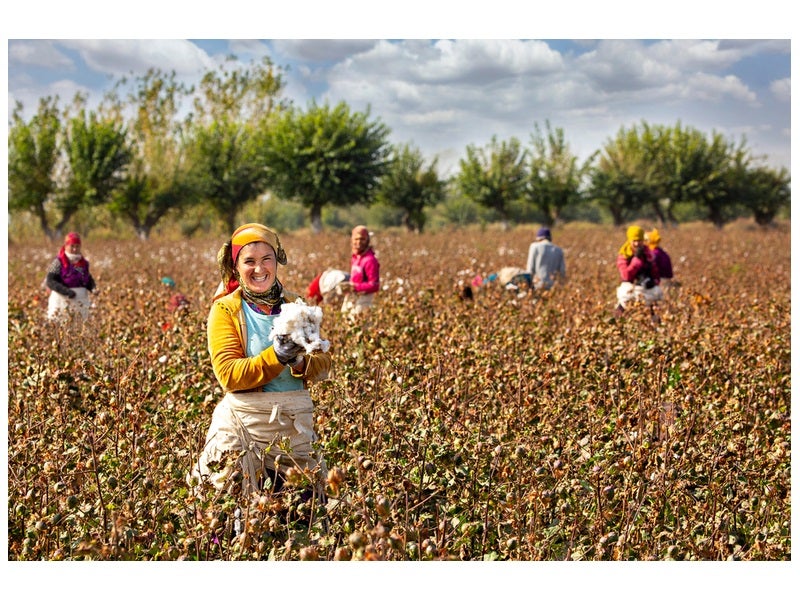
An estimated two million children have been taken out of child labour and half a million adults out of forced labour since the reform process of Uzbekistan’s cotton sector began seven years ago, the ILO says.
According to the forthcoming ‘2021 ILO Third-Party Monitoring Report of the Cotton Harvest in Uzbekistan’ based on eleven thousand interviews with cotton pickers, 99% of those involved in the 2021 cotton harvest worked voluntarily. All provinces and districts were said to have “very few or no” forced labour cases.
About 1% were subject to direct or perceived forms of coercion. The data shows that 0.47% of respondents reported direct or perceived threats by Mahalla representatives (local officials at the community level) related to social benefits, and 0.12% of respondents reported direct or perceived threats by employers related to loss of employment or wages.
The findings are the latest from the ILO Third-Party Monitoring project, which has been monitoring the cotton harvest in Uzbekistan since 2015 under an agreement with the World Bank.
The country has long been dogged by systemic use of child and forced labour in the cotton harvest and production processes, with a boycott against Uzbekistan cotton beginning in 2006 over the country’s long-standing practice of using forced labour to pick cotton – and is backed by more than 300 apparel brands and retailers.
In its statement this week, the ILO says a majority of cotton pickers who took part in interviews said that working conditions had improved since 2020, with 5% saying conditions were worse than the previous year. This relates to transportation, food, access to water, hygienic and other facilities.

US Tariffs are shifting - will you react or anticipate?
Don’t let policy changes catch you off guard. Stay proactive with real-time data and expert analysis.
By GlobalDataAccording to the report, one in eight people of working age in Uzbekistan participated in the cotton harvest – the world’s largest recruitment effort. 62% of pickers were women, and the vast majority were from rural areas.
“Our collaboration has yielded good results – because after seven years, this year’s report shows that Uzbek cotton is free from systemic child labour and systemic forced labour,” says ILO director-general Guy Ryder. “There is now an opportunity for Uzbekistan to realise its goal of moving up the value chain and to create millions of decent full-time jobs in textile and garment manufacturing.”
Uzbekistan is the sixth-largest cotton producer in the world. Under the leadership of President Shavkat Mirziyoyev, the country has embarked on reforms that include the modernisation of the country’s former agricultural economic model and the eradication of child labour and forced labour in the annual cotton harvest that was previously prevalent.
“We undertook these reforms to benefit our people and our economy. The starting point was to abolish the state order system for cotton production but we didn’t stop there,” says Tanzila Narbaeva, the chair of the Uzbek Senate and head of the National Commission to Combat Forced Labour and Human Trafficking.
“We worked tirelessly to change thinking and behaviour through awareness-raising campaigns on labour rights. We criminalised child labour and forced labour. We enhanced our labour inspection and we engaged in dialogue with civil society to identify common ground and solutions.”
Jonas Astrup, chief technical advisor of the ILO TPM Project in Uzbekistan, adds monitors observed new developments which indicate the democratisation of the labour market in Uzbekistan.
“For the first time, the minimum wage was consulted with not only the government but also the trade unions and employers of Uzbekistan. We also observed an emerging trend of collective bargaining at the grass-root level. Cotton pickers would engage in informal wage negotiations with farmers and textile clusters. Many pickers were paid well above the minimum wage as a result.”
The ILO Third-Party Monitoring project is implemented with support from the European Union, the US State Department, the Government of Switzerland, and Germany. It will conclude in May this year and by request of the government, and workers’ and employers’ organizations in Uzbekistan a feasibility study for a Better Work programme will be undertaken. The Better Work Programme is a joint initiative of the ILO and The World Bank Group.
With an on-the-ground presence in 12 countries across three continents, Better Work brings diverse groups together – governments, global brands, factory owners, and unions and workers – to improve working conditions in the garment industry and make the sector more competitive.
It recently rolled out a flagship programme in Sri Lanka.
The 2021 ILO Third-Party Monitoring Report of the Cotton Harvest in Uzbekistan will be published on 29 March.



